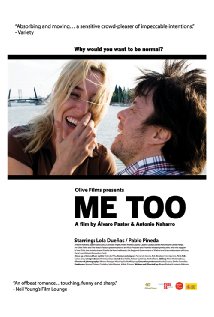
ME, TOO/ YO, TAMBIEN
Spain, 2009, 103 minutes, Colour.
Lola Duenas, Pablo Pineda.
Directed by Antonio Naharro, Alvaro Pastor.
Me, Too is a portrait of a man with Downs Syndrome, played with enthusiasm and skill by Pablo Pineda. The film is one of great empathy.
Daniel is aged 34, has had a university education, is well-read, takes up a job in an office, is generally supported by the staff, though they have to check their expectations and their attitudes. This is his story, especially his interest in one of the workers, Laura, and his falling in love with her, their time together, friendship, moments of intimacy, the issue of the sexual relationship.
Laura is an eccentric character, alienated from the family, living far away from them, erratic in her behaviour at work, clubbing and being rather promiscuous. She responds to Daniel, forming a friendship, sharing a great deal of time with him – and his falling in love with her and, ultimately, having to face the issue of a sexual relationship.
As part of the background, there are a number of men and women with Downs Syndrome, especially seen at a dancing class, working with teachers and a support group.
The film makes demands on the mainstream audience, their knowledge of Downs Syndrome, their understanding, the empathy, and facing humane and moral issues.
1. A humane film, dignity of the human person?
2. Spain, the city settings, the South of Spain? Landscapes, the town? Homes, workplaces, dance school, beaches…? The musical score?
3. Daniel’s story: aged 34, university education, intelligence and conversation, relationship with his parents, his mother educating him, relationship with his brother and sister-in-law, his friends? With Downs Syndrome? His acceptance? Self-confidence? The way that he was treated? Favourably? Unfavourably? At the dance school? Friends? Going to work, in the office, the jobs, interactions with the staff, different expectations? His cheerfulness? His hopes? Emotional loneliness? Sexuality?
4. Laura’s story, leaving home, alienation from the family, her being promiscuous life, easy going, arriving late to work? Her meeting with Daniel? The friendship, helping the office, photocopying machine…? His response to her? The friendship, the clubs, dancing? His expectations of her? Erratic behaviour?
5. Daniel’s parents, his mother, giving birth to a Downs Syndrome child, wanting the best, education? The more tolerant father? The brother, his fiancee, the family, friendship? Support?
6. Daniel, the infatuation with Laura, her company, conversations, walks, on the beach? Falling in love? The night with her, a once only? The effect on him?
7. Sexuality, the effect on Laura? Her going back home, her dying father, the relations and phone calls, clashes, the will?
8. The return, the friendship with Daniel – anything more?
9. The story of Pedro, Downs Syndrome, going to the dance class, the range of people at the class, the infatuation? The girl, her mother, her upset, her demands, complaints? The couple going off? In love? The tender scenes between them? The support of the group?
10. The film for audiences with Downs Syndrome, seeing their stories dramatised? Situations, status, emotions…?
11. For the wider audience, seeing the stories dramatised, getting to know the characters as persons, humanity, any disability seen within this context? Reflection on how Downs Syndrome persons cope, singled out, expectations, treatment? Emotions, friendship, love, sexuality?